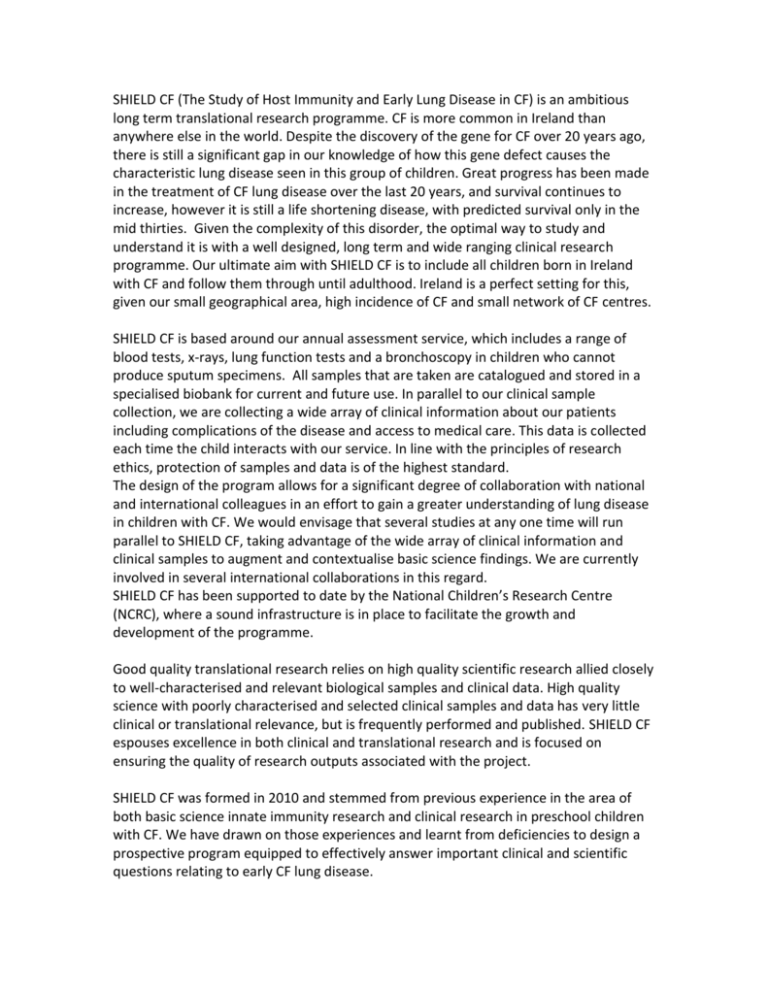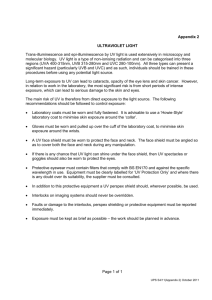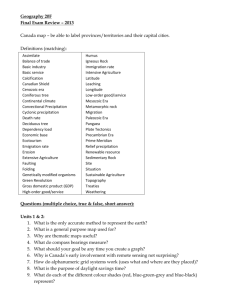shield cf - National Children`s Research Centre
advertisement

SHIELD CF (The Study of Host Immunity and Early Lung Disease in CF) is an ambitious long term translational research programme. CF is more common in Ireland than anywhere else in the world. Despite the discovery of the gene for CF over 20 years ago, there is still a significant gap in our knowledge of how this gene defect causes the characteristic lung disease seen in this group of children. Great progress has been made in the treatment of CF lung disease over the last 20 years, and survival continues to increase, however it is still a life shortening disease, with predicted survival only in the mid thirties. Given the complexity of this disorder, the optimal way to study and understand it is with a well designed, long term and wide ranging clinical research programme. Our ultimate aim with SHIELD CF is to include all children born in Ireland with CF and follow them through until adulthood. Ireland is a perfect setting for this, given our small geographical area, high incidence of CF and small network of CF centres. SHIELD CF is based around our annual assessment service, which includes a range of blood tests, x-rays, lung function tests and a bronchoscopy in children who cannot produce sputum specimens. All samples that are taken are catalogued and stored in a specialised biobank for current and future use. In parallel to our clinical sample collection, we are collecting a wide array of clinical information about our patients including complications of the disease and access to medical care. This data is collected each time the child interacts with our service. In line with the principles of research ethics, protection of samples and data is of the highest standard. The design of the program allows for a significant degree of collaboration with national and international colleagues in an effort to gain a greater understanding of lung disease in children with CF. We would envisage that several studies at any one time will run parallel to SHIELD CF, taking advantage of the wide array of clinical information and clinical samples to augment and contextualise basic science findings. We are currently involved in several international collaborations in this regard. SHIELD CF has been supported to date by the National Children’s Research Centre (NCRC), where a sound infrastructure is in place to facilitate the growth and development of the programme. Good quality translational research relies on high quality scientific research allied closely to well-characterised and relevant biological samples and clinical data. High quality science with poorly characterised and selected clinical samples and data has very little clinical or translational relevance, but is frequently performed and published. SHIELD CF espouses excellence in both clinical and translational research and is focused on ensuring the quality of research outputs associated with the project. SHIELD CF was formed in 2010 and stemmed from previous experience in the area of both basic science innate immunity research and clinical research in preschool children with CF. We have drawn on those experiences and learnt from deficiencies to design a prospective program equipped to effectively answer important clinical and scientific questions relating to early CF lung disease. SHIELD CF is a multi centre study. The purpose of this construction is to maximise the power and relevance of our research. The collation of higher volumes of clinical and laboratory data with a uniform approach is of benefit to all stakeholders. Membership and Governance SHIELD CF was set up in 2010 by Dr Paul McNally and Dr Barry Linnane at Our Lady’s Children’s Hospital Crumlin (OLCHC) and the National Children’s Research Centre (NCRC). Currently the study is active in 3 paediatric Centres, OLCHC, Tallaght Hospital and the University Hospital Limerick (UHL). Clinical samples are stored centrally at NCRC where the administration of SHIELD CF is based. The development of SHIELD CF has been funded by NCRC. SHIELD CF has a steering committee that oversees the study, provides governance and direction and assesses the scientific merit of potential collaborations. The steering group meets on an annual basis to review the operation of SHIELD CF, collaborations, security of samples, data and funding. Each centre has clinical investigators, all consultants in paediatric respiratory medicine, who perform clinical sampling procedures and oversee local patient involvement in the study. SHIELD CF employs local research assistants and research co-ordinators involved in both SHIELD CF and CF Clinical trials. Directors Dr Paul McNally (link) Dr Barry Linnane (link) Steering Group Dr Paul McNally Dr Barry Linnane Dr Jacinta Kelly – Deputy Director of Research, NCRC (link) Dr Sinead Nally – Clinical Research Project Manager, NCRC (link) Clinical Investigators OLCHC Dr Paul McNally (link) Dr Des Cox Dr Ahmed Zaid Tallaght Hospital Dr Peter Greally Dr Basil El Nazir UHL Dr Barry Linnane (link) Research Assistants/Co-ordinators OLCHC Donna Clarke Roisin Millar Tallaght Hospital Roisin Millar UHL Linda Kearse Current projects SHIELD CF Core Clinical Studies The POOL study: This is a multicentre study seeking to determine whether pooling of BAL aliquots amplifies the inflammatory signal while preserving microbiological accuracy. We are working with Dr Jane Davies in the Royal Brompton in London, Prof Claire Wainwright and Prof Peter Sly in Brisbane and Dr Barry Linnane in Limerick. Pulmonary Aspiration in Preschool Children with CF: This study is seeking to confirm previous findings of of our group suggesting pulmonary aspiration in older children with CF. We are seeking to determine if this is linked to pulmonary inflammation in preschool children as we have demostrated in older children. Location: OLCHC, NCRC, Tallaght. The CF Airway Microbiome: This study using advanced technologies is looking at the evolution of the lower airway microbiome in infants and children with CF, and in controls. The pilot study is completed and the longitudinal study is in progress. Location OLCHC, NCRC, Tallaght, Limerick. SHIELD CF Translational Studies Ecosanoid mediator class switching in CF airways: With the Urbach group at NCRC we have demonstrated a novel inherent defect in pro-resolution mediator synthesis in paediatric CF airways. Location: OLCHC, NCRC. The role of lipoxin A4 in modulating bacterial invasion and virulence in the CF airway: Dr Urbachs group have shown that lipoxin A4 can reduce airway epithelial cell bacterial invasion and transmigration in CF primary airways. We are investigating this further. Location OLCHC and NCRC. The effect of Lipoxin A4 in modulating CF airway injury and repair: Lipoxin A4 has been shown in the NCRC CF lab to accelerate airway epithelial healing and repair. With Dr Urbach’s group we are elucidating the precise mechanisms involved. Location OLCHC, NCRC. SHIELD CF Collaborations: Invariant Natural Killer T cells in CF: SHIELD CF has collaborated in this international study based in Germany: University Hospital Tubingen, Karolinska Institutet, University of Winsconsin, INSERM. Development of a point of care NE assay: We are working with Dr Lorraine Martin in the School of Pharmacy Queens University Belfast to develop this exciting bedside test that should enable clinicians to follow lung inflammation in CF more effectively. Anaerobeic bacterial infection in CFairways: This is an international, multicentre study looking at the role of anaerobic bacteria and how they may affect lung function and inflammation in CF. We are working with our colleaugues from RCSI, Beaumont Hospital, Queens University Belfast and the University of North Carolina, Chapel Hill. Macrophage oxidation enzymes: We are working with Prof Billy Bourke’s group at NCRC to investigate oxidative function in macrophages. Pilot project complete. Starting recruitement. Urinary biomarkers of airway injury in CF: We are working with Queens University Belfast and Mologic UK. Sample collection and biobanking is ongoing. Collaboration Collaborations with SHIELD CF should be well thought out, clinically relevant and preferably prospective. Collaboration is encouraged as it broadens the scope and standing of SHIELD CF but most importantly advances our understanding of early CF lung disease. Potential collaborations will be judged on the basis of the following: Scientific quality Clinical relevance to early CF lung disease Ease of execution Costs, and the management of these Benefit to the SHIELD CF programme The collaboration process is outlined in the following document: SHIELD CF governance, collaboration and access (link). Potential collaborators are asked to fill out the SHIELD CF Collaboration Proposal Form (link).






